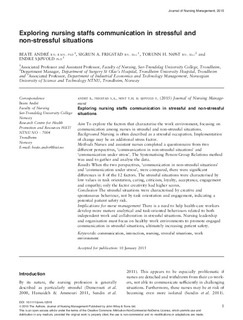Exploring nursing staffs communication in stressful and non-stressful situations
Journal article, Peer reviewed
Permanent lenke
http://hdl.handle.net/11250/297946Utgivelsesdato
2015Metadata
Vis full innførselSamlinger
Sammendrag
Aim: To explore the factors that characterise the work environment, focusing on
communication among nurses in stressful and non-stressful situations.
Background: Nursing is often described as a stressful occupation. Implementation
of change may be an additional stress factor.
Methods Nurses and assistant nurses completed a questionnaire from two
different perspectives, ‘communication in non-stressful situations’ and
‘communication under stress’. The Systematising Person-Group Relations method
was used to gather and analyse the data.
Results: When the two perspectives, ‘communication in non-stressful situations’
and ‘communication under stress’, were compared, there were significant
differences in 8 of the 12 factors. The stressful situations were characterised by
low values in task orientation, caring, criticism, loyalty, acceptance, engagement
and empathy; only the factor creativity had higher scores.
Conclusion: The stressful situations were characterised by creative and
spontaneous behaviour, not by task orientation and engagement, indicating a
potential patient safety risk.
Implications for nurse management There is a need to help health-care workers
develop more mature analytical and task-oriented behaviours related to both
independent work and collaboration in stressful situations. Nursing leadership
and organisation must focus on healthy work environments to promote engaged
communication in stressful situations, ultimately increasing patient safety.
Beskrivelse
-

